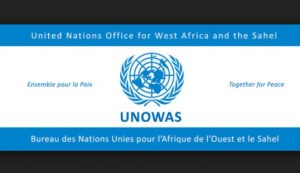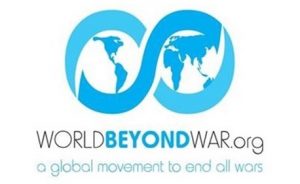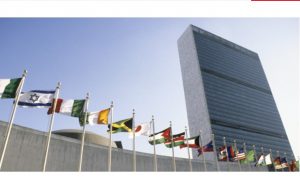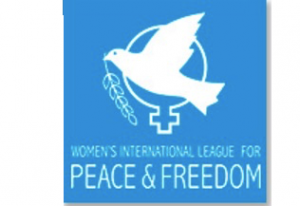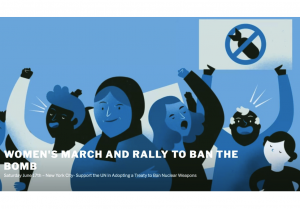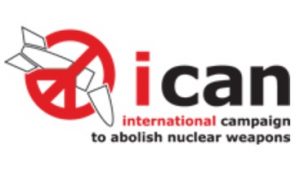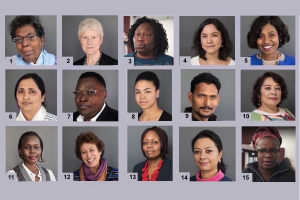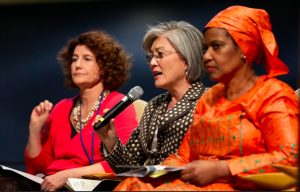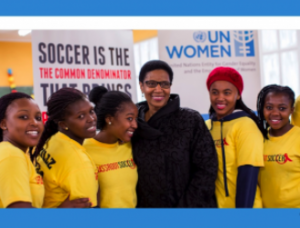DISARMAMENT & SECURITY .
An article by by Alyn Ware for Abolition 2000
On 16 February, approximately 100 countries gathered at the United Nations for the first session of negotiations on a legal agreement to prohibit nuclear weapons. The participants included two nuclear-armed States (China and India) and one NATO country (Netherlands) with the remaining being non-nuclear countries. (See the list of states participating below).
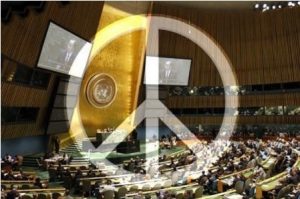
The negotiations are being undertaken in accordance with UN General Assembly Resolution 71/258 Taking forward multilateral nuclear disarmament negotiations, adopted on December 23 by a vote of 113 in favour, 35 opposed and 13 abstaining.
This first session of the ban treaty negotiations, which took place on Feb 16, 2017, considered procedural matters such as the election of officers, agenda for the negotiations, rules of procedure and participation of NGOs. The substantive negotiations on the proposed ban treaty will take place March 27-31 and June 17 –July 7.
Ambassador Elayne Whyte Gómez of Costa Rica was elected as Chair of the negotiations. Costa Rica has a strong track record on multilateral nuclear disarmament including being a member of the Latin America and Caribbean Nuclear-Weapon-Free Zone, being one of the leaders of the initiative which achieved an Advisory Opinion from the International Court of Justice in 1996 on the general illegality of nuclear weapons, chairing the 2013 sessions of the Open Ended Working Group on Taking Forward Nuclear Disarmament Negotiations (OEWG) which along with the 2016 sessions of the OEWG led to the UN General Assembly decision to initiate the ban treaty negotiations, and submitting a Model Nuclear Weapons Convention to the United Nations General Assembly and NPT Review Conferences as a guide to comprehensive nuclear disarmament negotiations.
One of the issues discussed was whether NGOs would be able to participate in the negotiations – meaning that they would have permission to speak and submit written papers – or whether they would only be able to attend and observe the proceedings. The vast majority of states agreed that NGOs would be able to participate. However, states might be able to object to the participation of certain NGOs they believe are not genuinely engaged in the issue, but such objection would need to be accompanied by a written explanation circulated to all participants.
Another issue was whether the proceedings should be bound by consensus or open to a vote. The majority of states supported having the option to vote in order to ensure that one or two states are not able to veto proceedings, and this was reflected in the rules of procedure.
The agenda for the March negotiations will include a general exchange of views on elements for the prohibition treaty, including: principles and objectives, preambular elements, core prohibitions, effective legal measures, legal provisions and norms, institutional arrangements and other provisions.
136 Japanese parliamentarians join nuclear disarmament statement on eve of ban treaty negotiations
On Feb 15, the eve of the first session of the ban treaty negotiations, M.P. Keisuke Suzuki (LDP), Secretary-General of the Japan section of PNND, sent to New York the endorsements of 136 Japanese parliamentarians for A Nuclear-Weapon-Free World: Our Common Good’, a joint statement of legislators and religious leaders from around the world. The endorsers were from all political parties and included former foreign ministers, ambassadors and other high level parliamentarians.
The statement warns about the risks of a nuclear catastrophe, whether by accident, intent or miscalculation, calls upon world leaders to commit to nuclear abolition and to replace nuclear deterrence with shared security approaches to conflicts, and supports a nuclear weapons convention or framework of agreements that eliminate nuclear weapons.
‘In Japan, there is broad support among the public and among parliamentarians for the effort toward a nuclear-weapon-free world,’ said Mr Suzuki (LDP), ‘The number of MPs who responded positively is very encouraging.’
(Continued in right column)
Can we abolish all nuclear weapons?
(Continued from left column)
UNFOLD ZERO consultation as ban treaty negotiations commence
Also on Feb15 in New York, UNFOLD ZERO and PNND held the fourth in a series of Consultations on nuclear disarmament negotiations and parliamentary action.
The consultation included diplomats, lawyers and representatives of disarmament NGOs, parliamentary organisations, youth networks and religious & interfaith organisations. It focused on three key multilateral processes, i.e. the ban treaty negotiations, Non-Proliferation Treaty review cycle, and the 2018 UN High Level Conference on Nuclear Disarmament.
The ban treaty negotiations were introduced by a representative of Austria, the country that submitted the draft resolution to the UN on commencing the negotiations. The 2018 UN High Level Conference was introduced by a representative of Indonesia, the country which submitted (on behalf of the non-Aligned Movement) the resolution by which the UN decided to hold the conference. Some interesting observations and suggestions were made at the consultation.
Here are a few:
The ban treaty is not an alternative to the NPT, but rather a measure where-by non-nuclear States can undertake action to implement their nuclear disarmament obligations;
The UN High Level Conference has the capacity to engage all states: nuclear-armed, allied and non-nuclear.
The 2018 UN High Level Conference could build on the ban treaty negotiations by providing a platform for states to announce their signature and/or ratification, assuming the treaty is negotiated by then;
The High Level Conference could include multiple strands, some of which everyone could agree to and be adopted by consensus, and others of which could be adopted by vote and apply to those who vote in favour;
In addition to pushing for agreements at the High Level Conference on specific multilateral measures, governments should also be encouraged to make individual voluntary commitments and offer concrete measures that they have already adopted (a ‘gift basket’ for the conference).
This approach has been very productive at the Nuclear Security Summits and other high level conferences.
Civil society and the governments leading the process for the UN High Level Conference need to step up the visibility and promotion of the conference.
States that were present at the Feb 16 organisational meeting for the ban treaty (unofficial list)
Algeria, Antigua and Barbuda, Argentina, Armenia, Austria, Azerbaijan, Bahrain, Bangladesh, Barbados, Belarus, Belize, Benin, Bhutan, Botswana, Brazil, Brunei, Burkina Faso, Cambodia, Chile, China, Colombia, Congo, Costa Rica, Cote d’Ivoire, Cuba, Cyprus, Democratic Republic of the Congo, Dominican Republic, Ecuador, Egypt, El Salvador, Eritrea, Ethiopia, Gabon, Ghana, Guatemala, Guyana, Haiti, Honduras, India, Indonesia, Iran (Islamic Republic of), Iraq, Ireland, Jamaica, Jordan, Kazakhstan, Kenya, Kuwait, Lao People’s Democratic Republic, Lebanon, Lesotho, Libya, Liechtenstein, Madagascar, Malaysia, Malta, Marshall Islands, Mexico, Mongolia, Morocco, Myanmar, Namibia, Netherlands, New Zealand, Nicaragua, Niger, Nigeria, Oman, Papua New Guinea, Paraguay, Peru, Philippines, Qatar, Republic of Moldova, San Marino, Saudi Arabia, Senegal, Singapore, South Africa, Sri Lanka, Swaziland, Sweden, Switzerland, Syrian Arab Republic, Tajikistan, Thailand, The Former Yugoslav Republic of Macedonia, Togo, Trinidad and Tobago, Tunisia, Uganda, Ukraine, United Arab Emirates, United Republic of Tanzania, Uruguay, Venezuela, Viet Nam, Yemen, Zambia, Zimbabwe
